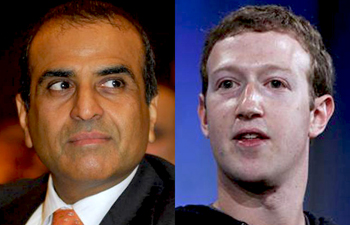Barcelona, Mar 9: Taking on social networking giant Facebook's ambitious 'free internet' plans, telecom major Bharti Airtel chief Sunil Mittal has said the companies should do 'philanthropy' if they stop charging for mobile internet.
 Facebook has launched an 'internet.org' initiative under which users can access internet free of charge for select websites if they come through a partner telecom operator.
Facebook has launched an 'internet.org' initiative under which users can access internet free of charge for select websites if they come through a partner telecom operator.
Incidentally, Airtel Africa is one such partner for Facebook, while rival Reliance Communications has partnered Facebook in India for this initiative, which is based on assumption that bringing more people to the internet fold by offering them free service initially is good for the industry.
Mittal, who met Facebook founder and CEO Mark Zuckerberg here at the Mobile World Congress, said that the social networking major is right in its thinking that such a would expand the market, but telecom operators also need to get their revenues and charge for the services.
"I told him (Zuckerberg) that you are right that this (internet.org) expands the market. At the end, you must understand that we (telecom operators) need to charge you for something. SMSes have gone more or less, voice is going down and they (Facebook) recognise that," Mittal said in a media interaction here.
"If you are going to make the data free, then let's do completely philanthropic projects. Government must make spectrum free, there should be free network, but it is not happening," the billionaire industrialist said, while adding that telecom companies were as such not making large money.
The comments, incidentally, come at a time when a high-pitched auction is underway in India for spectrum and committed bids worth about Rs 86,000 crore have come in within first four days of bidding -- crossing the minimum targetted amount of Rs 82,000 crore. The auction will resume tomorrow, as more unsold spectrum is left and there are expectations that the overall auction may cross Rs one lakh crore.
Telecom companies say they invest billions of dollars in spectrum, network and other operations, but they argue that internet-based entities offering pseudo-telecom services are piggy-backing on the mobile operators' networks without bearing much investments on their own.
At the same event here, UK-based telecom giant Vodafone's global CEO Vittorio Colao reportedly said about Facebook's free-of-cost internet plan that "it is almost like Zuckerberg does philanthropy, but with my money."
Mittal cautioned that investments in mobile networks by industry will go down as Internet-based messaging and calling services are 'cannibalising' revenues of telecom firms.
"He (Zuckerberg) is saying that make Internet.org lite version of Facebook free of data charge, so that people will upgrade. People will come to internet for the first time. The point is that it is self-serving for them," Mittal said.
Telecom operators have been facing pressure on their financials from the emergence of a number of Over-The-Top (OTT) firms like Facebook (through its WhatsApp messaging service), Skype and Viber, which on their part claim to be helping telecom operators grow business.
"We (telecom operators, social media and over-the-top players) are good for each other but they, regulators and politicians must understand that networks' investment must be on reasonable terms. Gone are the days when telecom companies were making large amounts of money," Mittal said.
"OTT players must understand pains of the mobile industry. Sometimes we are seeing as gatekeeper, bad guys. The fact of matter is spectrum - there is cost, network there is cost and tariff has gone up by only 3 paise in last three years," he added.
In December, Airtel had announced separate charges for Internet based calling services but withdrew it after an outcry on social media.
"The rate that we announced was exactly the same rate as a voice call. If you do one minute VoIP (internet based calls) in kilobyte terms it would be exactly the same as voice call. It was exactly the same as one minute call," Mittal said.






Comments
Add new comment